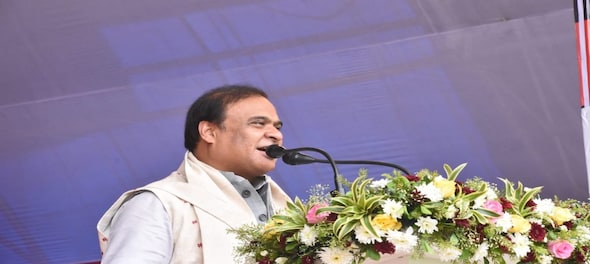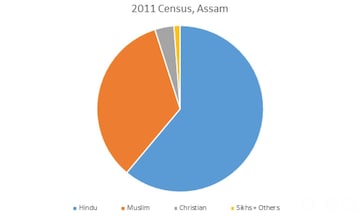
The Assam Cabinet repealed the Assam Muslim Marriages and Divorces Registration Act, a law that originated in pre-independent India. Assam Chief Minister Himanta Biswa Sarma claimed that the move will help the government prevent child marriages in the state.
Assam Muslim Marriages & Divorces Registration Act –The Key Contours
The law owes its origin to British colonial India. The act provided for ‘’Voluntary Registration of Muslim Marriages & Divorces.’’
The law empowered the local government to grant a license to any Muslim person, authorising him to register Muslim marriages & divorces. Currently, there are 94 Muslim registrars operating in Assam.
The act states that if the bride & the groom are minors (either or both), then "application shall be made on their behalf by their respective lawful guardians.’’
The act is also ambivalent when it comes to the issue of polygamy. The act is also ambivalent on types of relationships that are ‘prohibited’.
The Repealing of The Act – What It Means?
In simple terms, the repealing of the act means that every Muslim couple who wishes to voluntarily register their marriage, or get divorced within the jurisdiction of Assam will have to do so via the Special Marriage Act 1954 route. The minimum legal age for marriage under the SMA is as follows: 21 for boys, and 18 for girls. So essentially, Muslim child marriages in Assam will no longer have provision for legal sanctity.
Assam CM Himanta Biswa Sarma wrote on social media platform X:
This act contained provisions allowing marriage registration even if the bride and groom had not reached the legal ages of 18 and 21, as required by law. This move marks another significant step towards prohibiting child marriages in Assam.
On 23.22024, the Assam cabinet made a significant decision to repeal the age-old Assam Muslim Marriages & Divorces Registration Act. This act contained provisions allowing marriage registration even if the bride and groom had not reached the legal ages of 18 and 21, as required…
— Himanta Biswa Sarma (@himantabiswa) February 23, 2024
The SMA has also codified ‘degrees of prohibited relationships’. These are
The SMA also mandates that “neither party has a spouse living’’. A notice of at least 30 days needs to be given before the solemnisation of marriage under this act.
A quick caveat. As per a Supreme Court order from October 2007, all marriages must be registered without any exception for any religion. However, the truth is that not all Indians register their marriages. As of today, there is no law deeming an Unregistered Marriage as Invalid.
What Changes for The Muslim Community – In Assam?
With the act being repealed, Muslim child marriages will not have legal sanctity anymore.
However, the Muslim Personal Law (Shariat) Application Act of 1937 which allows polygyny (man with more than one wife) remains in force. The law extends to the whole of India, except for J&K.
Section 2 of the Shariat Act states:
In a case where both the parties are Muslim, the rule for decisions shall be Muslim law, if it involves any of the following matters:
The 4 primary sources of the Sharia Law are believed to be
Surah 4 (An-Nisa) of the Quran states: ‘’If you fear that you shall not be able to deal justly with the orphans, marry women of your choice, two, three or four; but if you fear that you shall not be able to deal justly (with them), then only one.’’ (Source: The Quran, Translated by Abdullah Yusuf Ali, page 49)
Polygamy is an offence under Section 494 of the Indian Penal Code. It is also banned under:
But the Shariat Act, which governs Muslim marriages allows Polygyny. The Supreme Court in a landmark judgement in 2015, ruled that a Muslim’s fundamental right to practise Islam did not include practising polygamy. The apex court has also ruled religious conversion for the sole purpose of practising bigamy as Unconstitutional.
As per the 2011 Census, over 1.07 crore people accounting for close to 34.22% of Assam’s population are Muslims.
Hindus: 61.47%
Christians: 3.74%

There were 27 districts in Assam when the Census was conducted. 9 of them had a Muslim majority population. Today, there are a total of 31 districts.
Assam Government’s Agenda
The Himanta Biswa Government has dubbed the move to repeal the Assam Muslim Marriages & Divorces Act as the first step towards a Uniform Civil Code. It has also constituted a three-member panel to draft an anti-polygamy law.
However, Sarma has categorically stated that tribals will be exempted from the ambit of the UCC. He said it would be the Assam Model of the UCC.
The Elephant in The Room – The Uniformity in UCC
In an article dated July 7, 2023, I argued why bringing the tribal community, a major vote bank for the BJP within the four walls of the UCC may not fructify.
In the context of Assam, as per the 2011 Census, the state has 3.88 million tribal population, accounting for 12.45% of the state’s population. While Article 44 of the Constitution, which comes under the Directive Principles of State Policy urges the state to endeavour towards a UCC, several provisions within the Constitution allow for distinct personal laws for tribal communities.
Several tribes in India practise polyandry (where a woman marries more than one man) & polygyny, citing socio-economic factors & age-old traditions.
For example: Mising, the 2nd largest tribal community of Assam practices exogamy, where a couple cannot marry if they are from the same clan. The custom of polygyny & cross-cousin marriages prevails. The forms of marriage within the Mising tribe also include – Elopement marriage, Marriage by capture & obtaining a girl by service (where a boy serves his prospective father-in-law for four to five years to win his daughter’s hand in marriage). However, a lot of these exclusive customs may be a rare occurrence in today’s time.
The last published National Family Survey Data 2019-2020 shows the prevalence of Polygyny (married women who stated their husbands had other wives) was highest among Scheduled Tribes at 2.4%.
Scheduled Castes: 1.5%
OBC: 1.3%
Others: 1.2%
When it came to religion, Polygyny among Christians was the highest at 2.1%.
Muslims: 1.9%
Hindus: 1.3%
Sikhs: 0.5%
Buddhists: 1.3%
Others: 2.5%
The national average of polygynous marriages was 1.4%, as compared to 1.9% in 2005-06.
Parting Shot
The decision of the Assam Government to stop the practice of legal registration for child marriages is certainly a step in the right direction. However, with no law in India yet outlawing Unregistered Marriages, the practice of child marriages and polygynous unregistered marriages cannot be detected & stopped completely.
Any attempt to leave the Tribal community out of the realm of the UCC, citing customary laws or socio-economic practices would dilute the spirit of Uniformity in UCC.
Tribes are a crucial vote bank for the BJP. Candidates backed by the party bagged 25 out of the 28 North Cachar Hills Autonomous Council seats, including 6 which they had won unopposed.
(Edited by : Sudarsanan Mani)
First Published: Feb 24, 2024 6:09 PM IST
Check out our in-depth Market Coverage, Business News & get real-time Stock Market Updates on CNBC-TV18. Also, Watch our channels CNBC-TV18, CNBC Awaaz and CNBC Bajar Live on-the-go!


BJP's Hindi heartland dominance faces test in phase 3 polls
May 2, 2024 9:14 PM
Lok Sabha Election: Re-elections at a Ajmer booth after presiding officer misplaces register of voters
May 2, 2024 4:54 PM

